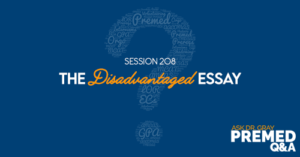
Walk through editing and reviewing a disadvantaged essay with me! The essay is focused on conveying the applicant’s disadvantaged status.
On the AMCAS application, there is a limited character count of 13,125 to communicate this information and express that the applicant identifies as a disadvantaged student. The challenge is how will you be able to convey your message well.
Ask Dr. Gray: Premed Q&A is brought to you by Blueprint MCAT. Listen to this podcast episode with the player above, or keep reading for the highlights and takeaway points.
The episodes in this podcast are recordings of our Facebook Live that we do at 3 pm Eastern on most weekdays. Check out our Facebook page and like the page to be notified. Also, listen to our other podcasts on MedEd Media. If you have any questions, call me at 617-410-6747.
PART 1 – “After graduating from high school, I immigrated to the United States from the Democratic Republic of the Congo to start college.
My parents traveled with me to make sure I had accommodations for an extended stay but had to travel back home.
So French, being the first language needed additional time to complete school assignments.”
The beginning part of the essay provides context – the student is an immigrant but being an immigrant to the country alone is not sufficient to determine the disadvantage.
The applicant provides additional details, such as French being their first language and requiring extra time to complete school assignments.
This could be considered a disadvantage, but despite the fact that additional time was needed, the student was able to complete the assignments.
Being disadvantaged does not only equate to poor academic performance. Objective indicators of struggle, such as low grades (getting C’s and D’s), are not the sole criteria for determining disadvantage.
Experiences like being homesick and dealing with depression can have an impact on both grades and overall well-being. The applicant’s struggles as an immigrant and feeling alone in a new country are valid disadvantages, even without specific tangible evidence like low grades.
The applicant’s disadvantage of being homesick for a few semesters is not unique to immigrant students, as it can happen to any student studying away from home.
While the language was also a factor, delving deeper into the challenges of acclimating to a new country and cultural issues would have been more interesting too. This will make the reader understand its impact on being a premed student.
The purpose of the application is to assess how the disadvantage hindered the applicant’s academic performance, extracurricular activities, and overall fit into the typical pre-med student profile. This will provide the reader context allowing a point of comparison between the applicant and others in similar situations.
A twist that highlights how the experience has helped the student is included in the essay creating a satisfying positive ending.
It successfully conveys the message that despite facing challenges, the student has found ways to adapt and persevere. It effectively communicates that the writer is an immigrant and shares the personal disadvantages experienced in their new country, particularly homesickness.
However, the essay’s strength may be questionable as it primarily focuses on homesickness and its impact on academic performance.
Despite this, if the essay accurately reflects the writer’s story, it can still be effective in conveying their struggles and reasons for subpar grades.
Medical School HQ Facebook page
Medical School HQ YouTube channel
Instagram @MedicalSchoolHQ
Join the Application Academy!
The Premed Playbook: Guide to the Medical School Personal Statement
The Premed Playbook: Guide to the Medical School Application Process

Lorem ipsum dolor sit amet, consectetur adipiscing elit
I just received my admission to XXXXX! This is unreal and almost feels like I am dreaming. I want to thank you for all of your help with my application. I cannot overstate how influential your guidance and insight have been with this result and I am eternally grateful for your support!
IM SO HAPPY!!!! THANK YOU SO MUCH FOR ALL YOUR HELP, IM INDEBTED TO YOU! Truly, thank you so much for all your help. Thank you doesnt do enough.
I want to take a few moments and thank you for all of your very instructive, kind and consistent feedback and support through my applications and it is your wishes, feedback, and most importantly your blessings that have landed me the acceptance!
I got into XXXXX this morning!!!! It still has not hit me that I will be a doctor now!! Thank you for all your help, your words and motivation have brought me to this point.
I wanted to once again express my heartfelt gratitude for your help in providing feedback during my secondary applications. Your guidance has been instrumental in my journey.
Just wanted to share my wonderful news! I received my first medical school acceptance! Thank you for all that you do for us Application Academy!!!
I am excited to tell you that I just got my third interview invite from XXXXX today! I can’t believe it. I didn’t even know if I was good enough to get one, let alone three – by mid-September. Thank you so much for all of your help and support up to this point; I would not be in this position without it!!
I wanted to thank you for helping me prepare for my XXXXX interview. Even in a 30-minute advising session, I learned so much from you. Thank you for believing in me, and here’s to another potential success story from one of your advisees!
I just received an acceptance with XXXXX! This is so exciting and such a huge relief and so nice to have one of our top choice schools! I also received an interview with XXXXX which brings the total up to 20 interviews! Thank so much, none of this would have been possible without you!